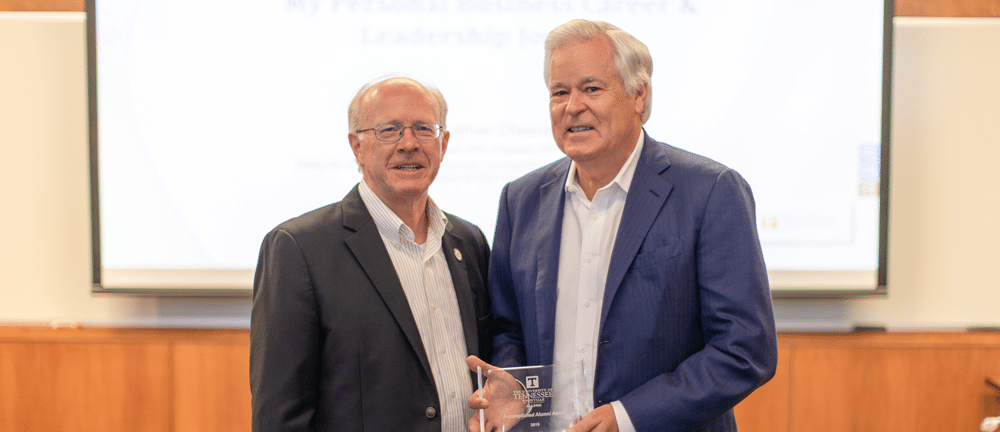
Lamar Chesney has reinvented himself as an executive continuously throughout his career. His executive-level experience covers nine industries and 11 companies including Delta Air Lines, Coca-Cola Enterprises, The Coca-Cola Company, Marsh & McLennan, and SunTrust Banks.
“To continuously reinvent yourself you must be comfortable being uncomfortable,” Chesney says. “People often seek comfort, but I would suggest they aren’t actually aiming for complacency. Not many are ever satisfied with such a state. Instead, I believe reinvention provides energy, passion, and purpose. It’s a matter of perpetual betterment, and so I don’t espouse to a defined finale.”
When Chesney came back to his alma mater in October, he emphasized this and other key lessons from his career in talks with business students. In his discussion, he indicated that many individuals throughout their career strive to “fix it” (a project, a business challenge, etc.) or “fix them” (others who do not align with your own vision, approach, objective). His focus for the day was about “fixing self” (change management from within the individual and as a leadership function).
These skills were built on Chesney’s foundation as a finance professional, established in the beginning at UT’s Haslam College of Business. During his recent visit to the college, Chesney received an Accomplished Alumni Award from the college’s dean, Stephen Mangum.
“Lamar has worked in a diverse group of companies and industries,” Mangum said in presenting the award. “If you look at it from the occupational perspective he’s done operations, supply chain, and finance. I don’t know how many of the core business disciplines Lamar has expertise in, but it’s certainly an amazing career.”
For Chesney, self-discovery is a process that should be evaluated every year with the simple question: “Am I happy?” He encourages a fluid relationship to one’s employment as a method of staying passionate about work.
“There is a natural tendency for an enterprise to want some homogeneity, but you don’t want to lose your own personal identity,” Chesney said. “If everybody assimilates completely, creativity and innovation diminish, and that’s when companies die. You need that annual ‘am I happy’ assessment because you may find you feel stifled and have nowhere left to go in that particular enterprise. You need to have that realization and find the courage to reinvent yourself to find that happiness.”
When asked what he might do had he not pursued the path of an executive, Chesney said he would have devoted himself to coaching and mentoring. He has come to discover that is what brought him the most satisfaction during the course of his career, and he currently devotes his time to motivational speaking and guiding teams and executives through transformations.
“What I found as my career progressed from management into leadership is that fulfillment came not so much from what I did, but more so from how I did it,” Chesney said. “I want to encourage people to be authentic and genuine and connect with the world in the space they are in. Finding self is the ultimate goal of finding happiness.”
“To continuously reinvent yourself you must be comfortable being uncomfortable,” Chesney says. “People often seek comfort, but I would suggest they aren’t actually aiming for complacency. Not many are ever satisfied with such a state. Instead, I believe reinvention provides energy, passion, and purpose. It’s a matter of perpetual betterment, and so I don’t espouse to a defined finale.”
When Chesney came back to his alma mater in October, he emphasized this and other key lessons from his career in talks with business students. In his discussion, he indicated that many individuals throughout their career strive to “fix it” (a project, a business challenge, etc.) or “fix them” (others who do not align with your own vision, approach, objective). His focus for the day was about “fixing self” (change management from within the individual and as a leadership function).
These skills were built on Chesney’s foundation as a finance professional, established in the beginning at UT’s Haslam College of Business. During his recent visit to the college, Chesney received an Accomplished Alumni Award from the college’s dean, Stephen Mangum.
“Lamar has worked in a diverse group of companies and industries,” Mangum said in presenting the award. “If you look at it from the occupational perspective he’s done operations, supply chain, and finance. I don’t know how many of the core business disciplines Lamar has expertise in, but it’s certainly an amazing career.”
For Chesney, self-discovery is a process that should be evaluated every year with the simple question: “Am I happy?” He encourages a fluid relationship to one’s employment as a method of staying passionate about work.
“There is a natural tendency for an enterprise to want some homogeneity, but you don’t want to lose your own personal identity,” Chesney said. “If everybody assimilates completely, creativity and innovation diminish, and that’s when companies die. You need that annual ‘am I happy’ assessment because you may find you feel stifled and have nowhere left to go in that particular enterprise. You need to have that realization and find the courage to reinvent yourself to find that happiness.”
When asked what he might do had he not pursued the path of an executive, Chesney said he would have devoted himself to coaching and mentoring. He has come to discover that is what brought him the most satisfaction during the course of his career, and he currently devotes his time to motivational speaking and guiding teams and executives through transformations.
“What I found as my career progressed from management into leadership is that fulfillment came not so much from what I did, but more so from how I did it,” Chesney said. “I want to encourage people to be authentic and genuine and connect with the world in the space they are in. Finding self is the ultimate goal of finding happiness.”